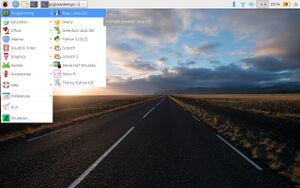Raspbian
Topic: Software
 From HandWiki - Reading time: 3 min
From HandWiki - Reading time: 3 min
 | |
| Developer | Raspberry Pi Foundation |
|---|---|
| OS family | Unix / Linux |
| Working state | Current |
| Source model | Open source |
| |Final release|Latest release}} | Raspbian Buster / 2019-09-26[1] |
| Marketing target | Raspberry Pi |
| Available in | English |
| Update method | APT |
| Package manager | dpkg |
| Platforms | ARM i386 version available[2] |
| Kernel type | Monolithic |
| Userland | GNU |
| Default user interface | PIXEL,[3] LXDE |
| License | Free and open-source software licenses (mainly GPL) |
| Support status | |
| Supported | |
Raspbian is a Debian-based computer operating system for Raspberry Pi. There are several versions of Raspbian including Raspbian Buster and Raspbian Stretch. Since 2015 it has been officially provided by the Raspberry Pi Foundation as the primary operating system for the family of Raspberry Pi single-board computers.[4] Raspbian was created by Mike Thompson and Peter Green as an independent project.[5] The initial build was completed in June 2012.[6] The operating system is still under active development. Raspbian is highly optimized for the Raspberry Pi line's low-performance ARM CPUs.
Raspbian uses PIXEL, Pi Improved X-Window Environment, Lightweight as its main desktop environment as of the latest update. It is composed of a modified LXDE desktop environment and the Openbox stacking window manager with a new theme and few other changes. The distribution is shipped with a copy of computer algebra program Mathematica and a version of Minecraft called Minecraft Pi[7] as well as a lightweight version of Chromium as of the latest version.[8]
Version history
| Release Date | Release
Name [9] |
Debian Version | Linux Kernel | GCC | apt | X Server | Pi 1/1+ | Pi 2 | Pi 3 | Pi
Zero W |
Pi 3+ | Pi 4 |
|---|---|---|---|---|---|---|---|---|---|---|---|---|
| 2013-09-27 | 2013-09-25 | 7
(Wheezy) |
3.6 | 4.7.2 | 0.9.7 | 7.7 | ||||||
| 2013-10-07 | 2013-09-25 | |||||||||||
| 2013-12-24 | 2013-12-20 | 3.10 | ||||||||||
| 2014-01-09 | 2014-01-07 | |||||||||||
| 2014-06-22 | 2014-06-20 | 3.12 | ||||||||||
| 2014-07-08 | 2014-06-20 | |||||||||||
| 2014-09-12 | 2014-09-09 | |||||||||||
| 2014-10-08 | 2014-09-09 | |||||||||||
| 2014-12-25 | 2014-12-24 | |||||||||||
| 2015-02-02 | 2015-01-31 | 3.18 | ||||||||||
| 2015-02-17 | 2015-02-16 | |||||||||||
| 2015-02-18 | 2015-02-16 | |||||||||||
| 2015-05-07 | 2015-05-05 | |||||||||||
| 2015-05-12 | 2015-05-05 | |||||||||||
| 2015-09-28 | 2015-09-25 | 8
(Jessie) |
4.1 | 4.9 | 1.0.9.8.1 | |||||||
| 2015-11-24 | 2015-11-21 | |||||||||||
| 2016-02-08 | 2016-02-03 | |||||||||||
| 2016-02-09 | 2016-02-09 | |||||||||||
| 2016-02-29 | 2016-02-26 | |||||||||||
| 2016-03-18 | 2016-03-18 | |||||||||||
| 2016-05-13 | 2016-05-10 | 4.4 | ||||||||||
| 2016-05-31 | 2016-05-27 | |||||||||||
| 2016-09-28 | 2016-09-23 | |||||||||||
| 2016-11-29 | 2016-11-25 | |||||||||||
| 2017-02-27 | 2017-02-16 | 4.9 | ||||||||||
| 2017-03-03 | 2017-03-02 | |||||||||||
| 2017-04-10 | 2017-04-10 | |||||||||||
| 2017-06-23 | 2017-06-21 | |||||||||||
| 2017-07-05 | 2017-07-05 | |||||||||||
| 2017-08-17 | 2017-08-16 | 9
(Stretch) |
6.3 | 1.4.6 | ||||||||
| 2017-09-08 | 2017-09-07 | |||||||||||
| 2017-11-29 | 2017-11-29 | |||||||||||
| 2018-03-13 | 2018-03-13 | |||||||||||
| 2018-04-18 | 2018-04-18 | 4.14 | 1.4.8 | |||||||||
| 2018-06-29 | 2018-06-27 | |||||||||||
| 2018-10-09 | 2018-10-09 | |||||||||||
| 2018-11-13 | 2018-11-13 | |||||||||||
| 2019-04-08 | 2019-04-08 | 1.4.9 | ||||||||||
| 2019-06-24 | 2019-06-20 | 10
(Buster) |
4.19 | 8.3 | 1.8.2 | |||||||
| 2019-07-10 | 2019-07-10 | |||||||||||
| 2019-09-30 | 2019-09-26 | |||||||||||
| Release Date | Release
Name |
Debian Version | Linux Kernel | GCC | apt | X Server | Pi 1/1+ | Pi 2 | Pi 3 | Pi
Zero W |
Pi 3+ | 4 |
Reception
Jesse Smith from DistroWatch Weekly reviewed Raspbian in 2015:[10]
Though I did not intend to run the Raspberry Pi as a desktop computer, the Raspbian operating system does provide users with the LXDE desktop environment. The Pi does not have a great deal of processor speed or memory, but it does have enough resources to run LXDE and a handful of applications. So long as the user does not wish to do a lot at once, the Pi offers a fairly responsive desktop interface. I probably would not run heavier programs such as LibreOffice or Firefox on the Pi, but Raspbian does provide the Epiphany web browser and a few other desktop programs.
See also
- NOOBS (installer)
References
- ↑ "Release Notes". https://downloads.raspberrypi.org/raspbian/release_notes.txt.
- ↑ https://www.raspberrypi.org/blog/pixel-pc-mac/
- ↑ "Introducing PIXEL" (in en-GB). https://www.raspberrypi.org/blog/introducing-pixel/.
- ↑ "Download Raspbian for Raspberry Pi" (in en-GB). https://www.raspberrypi.org/downloads/raspbian/.
- ↑ "RaspbianAbout - Raspbian". https://www.raspbian.org/RaspbianAbout.
- ↑ "FrontPage - Raspbian". https://www.raspbian.org/.
- ↑ Mathematica and the Wolfram Language are included in this release under license and with permission of Wolfram Research, Inc. and may be used for non-commercial purposes only. raspberrypi.org Download Raspbian for Raspberry Pi
- ↑ "Introducing PIXEL - Raspberry Pi" (in en-GB). Raspberry Pi. 2016-09-28. https://www.raspberrypi.org/blog/introducing-pixel/.
- ↑ used with release notes and .img files
- ↑ DistroWatch Weekly, Issue 615, 22 June 2015
External links
 KSF
KSF